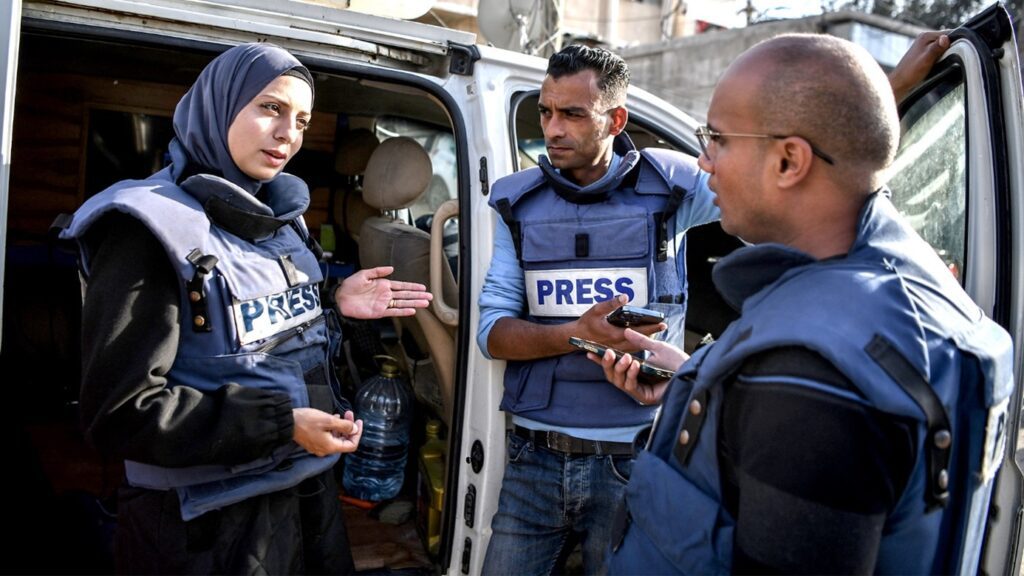In a recent interview on The Daily Show, CNN’s Christiane Amanpour got herself into a bit of hot water when she claimed that “journalists are not on the ground in Gaza”. Challenged by host Jon Stewart, who pointed out that there are plenty of Palestinian reporters in the Strip, Amanpour clarified that she meant “independent Western journalists are not able to get there”.
The exchange raises the question of who is best placed to report on humanitarian situations. Is it the cadre of “international” journalists or their local counterparts?
Historically, self-described global outlets such as CNN and BBC have been prone to cover events in the non-Western world through the lens of foreign correspondents – a travelling band of primarily Western journalists who tend to cover wide areas and multiple countries for the benefit of largely Western audiences. Many are the times you will hear one of these described as “the first Western journalist on the scene”, as if this marks a significant turning point in the quality of coverage. Local journalists, on the other hand, are relegated to a supporting role as fixers or background reporters.
Events in Gaza, however, have exposed and upended this system. With international journalists locked out of the enclave by Israel, reporting on the horrific assault on the population has fallen to Palestinian journalists, who, despite being targeted by the Israeli military – more than 120 have been killed according to the UN – have carried out their task with awe-inspiring bravery, dedication, and professionalism.
Now, with a growing clamour to let in the international set, the question is whether these foreign correspondents are actually needed, and to what extent their presence would improve anyone’s understanding of the situation.

Abed Zagout/Anadolu
TRT Arabi Reporter Reba Khalid al-Ajami talks to colleagues as she reports from Gaza amid the ongoing Israeli assault on the enclave, on 29 February 2024.
Clearly Western journalists do not represent “everybody who’s not a local” as Amanpour suggested. While their reports are beamed out to audiences across the globe, they largely represent and speak to their home audiences. Their journalism thus reflects and is accountable to these audiences and – in the words of the late journalism professor, John Merrill – “cannot exceed the limits permitted by the society; on the other hand it cannot lag very far behind”. This is reflected by the reporting they have been doing from outside Gaza, which, broadly speaking, has reflected rather than challenged prevailing opinions.
Rather than supplement the work of local journalists, there is reason to fear that Western journalists would seek to supplant it. A decade ago, Kenyan writer Nanjala Nyabola described the privileging of Western journalists as an “unspoken hierarchy of knowledge” that “inadvertently disregarded the lived experiences of the thousands of literate, experienced [local] writers, journalists and informants”.
This is reflected in the findings of a study by Nilofar Absar, who has conducted numerous interviews of local journalists working as fixers for big Western outlets. Many complained that their work was frequently unrecognised by their international counterparts, or devalued and considered with suspicion. As Amanpour demonstrated, colonial suspicions that non-Western journalists are not as reliable or resistant to bias as their Western counterparts are still prevalent.
Furthermore, local and non-local journalists often play different roles when covering humanitarian crises. A 2009 study comparing the coverage of Hurricane Katrina’s 2005 devastation of New Orleans on the US Gulf Coast in local, regional, and national newspapers found that the more local a newspaper was to the epicentre of the tragedy, the more likely it was to “assume the role of spokesperson for the voiceless thousands who had no public arena in which to be heard”. Kathleen Bartzen Culver, director of the UW-Madison School of Journalism and Mass Communication, has noted that “the flavour of the local journalism was quite different than national journalism outlets, which didn’t necessarily have the context”.
Amanpour is not entirely mistaken about the value of non-local journalists. They can provide an important external perspective, even pursuing angles that local journalists, immersed as they are in the tragedy, miss. There can be valid concerns – though frequently overplayed – about the impartiality of local journalists reporting on conflicts involving their kith and kin. And it is undoubtedly true that local journalists in many conflicts do not enjoy the same protections and privileges accorded to their Western counterparts, whether because of race, fear of antagonising Western governments, or just a recognition of the power of Western media to influence global narratives. That means journalists from these outlets can often boldly go where locals fear to tread.
But all this must be balanced against the tendency of foreign journalists to overwhelm nuanced local perspectives with the broad-brush narratives necessary to compress complex situations into two-minute segments.
Not all perspectives are born equal. Like Nyabola, most would probably prefer “truth… based on experience on the ground”. This in fact is why journalists travel to the scene of crises in the first place – to approximate that lived experience. And coverage by locals is all the more important given that “international” media rarely sticks to a story for very long before moving on to the next one. “You see the networks sending six people… and doing their live and emotionally charged standups,” says Culver. “[B]ut the most important question is, ‘Are they going to be there six months from now, asking questions?’” In most cases, it is in fact the local reporters who will be left to pick up the pieces after the international media storm blows through.
It also does not account for the biases that international journalists bring to the stories they cover, and the hugely underrated commitment of local journalists to professional conduct.
In many ways, the uproar against Amanpour was really a scepticism about the validity of an “international” journalism model that portrays itself as not local to anywhere. Why do we need a roving band that parachutes into humanitarian spaces as if the people there are incapable of telling their own story? Why wouldn’t CNN or Sky News give their platforms to local journalists, whether in Sudan or the Democratic Republic of the Congo, rather than send non-locals who probably know much less? Why should an American or British journalist, rather than a Palestinian, be the face of their Gaza coverage? Does that really serve their audiences best?
There are interesting similarities between the coverage of Gaza and that of Katrina. In an article for The Guardian, Jeff Jarvis notes how the hurricane “rendered worthless the printing presses and broadcast towers that made big media big” and forced local reporting online. Out-of-town outlets were also forced to turn to the internet to gather and share news. According to Jarvis, this had a significant impact on how the story was told: “Usually, of course, we see the big story varnished and polished by national papers and international networks. But with Katrina, local journalists, survivors themselves, exposed their raw nerves and anger.”
This was profound, as Jarvis pointed out. By handing the microphone to the people experiencing the tragedy, the “news was freed from the shackles of media”, as he eloquently put it. “Now he who controls distribution no longer controls news. And news is no longer shaped by the pipe that carries it. That is what Katrina did to the news”.
Perhaps Gaza could do something similar for coverage of humanitarian disasters globally? At The New Humanitarian, our experience in covering crises for nearly two decades indicates that it is not necessarily a zero-sum proposition. Partnerships between international and local journalists can be useful in leveraging the relative strengths of both. So rather than global outlets flying small bands of foreign correspondents and celebrity anchors around the world to provide inevitably spotty coverage of humanitarian situations, it might be better to partner with local media and local journalists who could format stories and perspectives for external audiences.
Partnerships could take many forms and not just be reserved for when crises become horrendous. Last year, for example, TNH introduced a Humanitarian Reporting Fellowship, which is meant to give local humanitarian journalists in the non-Western world experience in doing exactly that, while also allowing them to challenge and influence how we cover the crises in their home countries.
Such partnerships can help external audiences grapple with the nuances of situations even before they become full-blown catastrophes, and help them empathise with people on the other side of the world. As Amanpour says, “actual local journalists would tell you about a people, not just, you know, dehumanising numbers”. Rather than trying to be “the eyes and ears of everybody… who’s not a local”, the media would allow people around the world to see crises through the most important perspectives of all: those who experience them.
This article was first published by the New Humanitarian:

